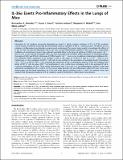| dc.contributor.author | Ramadas, Ravisankar A. | |
| dc.contributor.author | Ewart, Susan L. | |
| dc.contributor.author | Iwakura, Yoichiro | |
| dc.contributor.author | Medoff, Benjamin D. | |
| dc.contributor.author | LeVine, Ann Marie | |
| dc.date.accessioned | 2013-04-10T20:20:13Z | |
| dc.date.issued | 2012 | |
| dc.identifier.citation | Ramadas, Ravisankar A., Susan L. Ewart, Yoichiro Iwakura, Benjamin D. Medoff, and Ann Marie LeVine. 2012. IL-36α exerts pro-inflammatory effects in the lungs of mice. PLoS ONE 7(9): e45784. | en_US |
| dc.identifier.issn | 1932-6203 | en_US |
| dc.identifier.uri | http://nrs.harvard.edu/urn-3:HUL.InstRepos:10524345 | |
| dc.description.abstract | Interleukin (IL-) 36 cytokines (previously designated as novel IL-1 family member cytokines; IL-1F5– IL-1F10) constitute a novel cluster of cytokines structurally and functionally similar to members of the IL-1 cytokine cluster. The effects of IL-36 cytokines in inflammatory lung disorders remains poorly understood. The current study sought to investigate the effects of IL-36α (IL-1F6) and test the hypothesis that IL-36α acts as a pro-inflammatory cytokine in the lung in vivo. Intratracheal instillation of recombinant mouse IL-36α induced neutrophil influx in the lungs of wild-type C57BL/6 mice and IL-1αβ−/− mice in vivo. IL-36α induced neutrophil influx was also associated with increased mRNA expression of neutrophil-specific chemokines CXCL1 and CXCL2 in the lungs of C57BL/6 and IL-1αβ−/− mice in vivo. In addition, intratracheal instillation of IL-36α enhanced mRNA expression of its receptor IL-36R in the lungs of C57BL/6 as well as IL-1αβ−/− mice in vivo. Furthermore, in vitro incubation of CD11c+ cells with IL-36α resulted in the generation of neutrophil-specific chemokines CXCL1, CXCL2 as well as TNFα. IL-36α increased the expression of the co-stimulatory molecule CD40 and enhanced the ability of CD11c+ cells to induce CD4+ T cell proliferation in vitro. Furthermore, stimulation with IL-36α activated NF-κB in a mouse macrophage cell line. These results demonstrate that IL-36α acts as a pro-inflammatory cytokine in the lung without the contribution of IL-1α and IL-1β. The current study describes the pro-inflammatory effects of IL-36α in the lung, demonstrates the functional redundancy of IL-36α with other agonist cytokines in the IL-1 and IL-36 cytokine cluster, and suggests that therapeutic targeting of IL-36 cytokines could be beneficial in inflammatory lung diseases. | en_US |
| dc.language.iso | en_US | en_US |
| dc.publisher | Public Library of Science | en_US |
| dc.relation.isversionof | doi:10.1371/journal.pone.0045784 | en_US |
| dc.relation.hasversion | http://www.ncbi.nlm.nih.gov/pmc/articles/PMC3447790/pdf/ | en_US |
| dash.license | LAA | |
| dc.subject | Biology | en_US |
| dc.subject | Anatomy and Physiology | en_US |
| dc.subject | Immune Physiology | en_US |
| dc.subject | Cytokines | en_US |
| dc.subject | Immunology | en_US |
| dc.subject | Immune System | en_US |
| dc.subject | Immunity | en_US |
| dc.subject | Inflammation | en_US |
| dc.subject | Model Organisms | en_US |
| dc.subject | Animal Models | en_US |
| dc.subject | Mouse | en_US |
| dc.subject | Medicine | en_US |
| dc.subject | Clinical Immunology | en_US |
| dc.subject | Pulmonology | en_US |
| dc.title | IL-36α Exerts Pro-Inflammatory Effects in the Lungs of Mice | en_US |
| dc.type | Journal Article | en_US |
| dc.description.version | Version of Record | en_US |
| dc.relation.journal | PLoS ONE | en_US |
| dash.depositing.author | Medoff, Benjamin D. | |
| dc.date.available | 2013-04-10T20:20:13Z | |
| dc.identifier.doi | 10.1371/journal.pone.0045784 | * |
| dash.contributor.affiliated | Medoff, Benjamin | |


